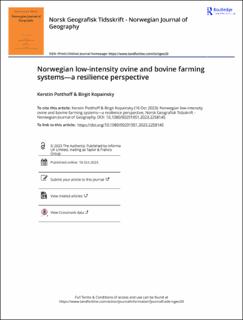Norwegian low-intensity ovine and bovine farming systems—a resilience perspective
Journal article, Peer reviewed
Published version

View/
Date
2023Metadata
Show full item recordCollections
- Department of Geography [634]
- Registrations from Cristin [9766]
Original version
Norsk Geografisk Tidsskrift. 2023, 77 (4), 224-242. https://doi.org/10.1080/00291951.2023.2258145Abstract
The concept of socio-ecological resilience can be used to understand and measure to what degree farming systems are able to handle and adapt to disturbances. The article is based on the application of a framework for resilience assessment in European farming systems to the Norwegian low-intensity ovine and bovine farming systems. The aim is to identify the characteristics of farming systems and important trends in them. Interviews held at county and municipality level, and statistical data revealed that farming systems appeared quite robust, and resource-strong in terms of adhering and adjusting to current and coming environmental and animal welfare regulations, although some coming regulations may put farms under pressure and result in farm exit. Assessing the consequences of development trends envisioned by two scenarios underlines that the provision of goods and services by farming systems may be challenged in the future and that resilience needs to be enhanced. The authors conclude that the current war in Ukraine and its impacts on the food market, as well as the increased electricity prices in Norway, are examples of contextual changes that may challenge agricultural production. In this context, the article can serve as a baseline to reassess the resilience of farming systems.
